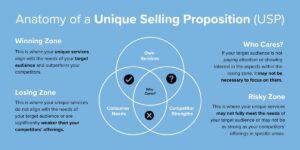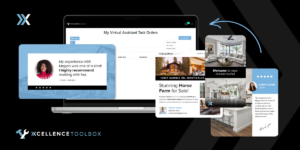Embark on a comprehensive guide to unlock the secrets of exceptional branding in the Real Estate industry. Explore the importance of a powerful brand identity, learn from common pitfalls, and access valuable resources.

In today’s highly competitive real estate landscape, the significance of establishing a powerful brand cannot be overstated. A strong brand not only differentiates you from the competition but also fosters trust and credibility among clients, ultimately leading to increased business opportunities.
The importance of branding in the real estate industry is multifaceted. It’s not just about having a pretty logo or a snazzy website (although those are important too). A well-crafted brand not only enhances an agent’s professional image but also serves as a beacon that attracts potential clients seeking a unique and personalized experience.
Moreover, a powerful brand fosters long-lasting relationships, enabling agents to leverage the power of word-of-mouth referrals and maintain a steady stream of business. In an era of rapid technological advancement, embracing innovation and leveraging technology is essential for real estate professionals seeking to build a powerful brand.
A game-changing tool in today’s branding landscape is the use of artificial intelligence (AI) language models, such as ChatGPT. This AI-powered assistant can assist real estate professionals in refining their brand messaging, creating engaging content, and developing a consistent brand voice that resonates with their target audience.
To embark on the journey of building a powerful brand, let’s dive into our 5 essential steps for real estate agents to build a powerful brand.
These tips will offer actionable insights and practical strategies for enhancing your online presence, maximizing social media potential, nurturing valuable professional relationships, and embracing innovation. As we explore these aspects, we will also demonstrate how AI language models like ChatGPT can become your invaluable ally in the branding game.
The Importance of Branding in Real Estate
Branding plays a vital role in the real estate industry, offering several benefits that contribute to your success.
1. Differentiation: In a saturated market, it’s essential to establish a unique identity that sets you apart from other agents. A strong brand communicates your expertise, values, and unique selling proposition (USP) to potential clients, making it easier for them to choose you over competitors.
2. Trust and Credibility: A well-established brand instills trust and confidence in your clients, as they perceive you as a professional who is dedicated to delivering exceptional service. This trust can lead to more referrals and repeat business, which are vital for long-term success.
3. Client Experience: Your brand should reflect the level of service and experience you provide to your clients. By maintaining a consistent brand image across all touchpoints, you can ensure that your clients have a seamless and memorable experience, leading to positive word-of-mouth referrals.
4. Professional Growth: Building a powerful brand not only helps you attract more clients but also opens doors to new opportunities, such as speaking engagements, media appearances, and collaborations with other industry professionals.
Common Mistakes in Real Estate Branding
While the importance of branding in real estate is evident, many professionals make mistakes that hinder their growth.
1. Lack of Clarity: Many real estate professionals struggle to define their unique value proposition, which results in a weak or unclear brand message. Make sure to identify your USP and communicate it effectively to your target audience.
2. Ignoring Online Presence: In today’s digital age, an outdated or poorly designed website can harm your brand’s reputation. Ensure that your online presence is user-friendly, visually appealing, and consistently reflects your brand’s message.
3. Neglecting Networking: Building relationships with other professionals and community members is crucial for brand growth. Attend industry events, join professional associations, and collaborate with others to expand your network and gain valuable insights.
4. Overlooking Customer Service: Providing exceptional customer service is not only essential for client satisfaction but also for building a powerful brand. Make sure to prioritize communication, personalization, and problem-solving to create a positive client experience.
1. Developing a Unique Selling Proposition (USP)
Your USP is like your secret weapon, the thing that sets you apart from other agents. It’s the unique value you offer to your clients that no one else can match. In this section, we’ll dive deep into crafting your USP, providing you with valuable tips, strategies, resources, and examples to help you build a powerful brand.
To find your USP, ask yourself
- What makes me different from other agents?
- What specific needs or problems do I solve for my clients?
- What are my clients’ pain points, and how do I alleviate them?
Key Factors for Crafting a Powerful USP
By considering these factors, you can create a compelling USP that sets your real estate business apart, attracts your ideal clients, and contributes to your long-term success:
1. Identify Your Target Audience: Understand who your ideal clients are, their needs, and preferences. This will help you tailor your USP to resonate with them effectively.
2. Analyze Competitors: Study your competitors to identify gaps in their services or areas where they might be lacking. This will help you pinpoint unique aspects of your business that you can highlight in your USP.
3. Emphasize Unique Skills and Expertise: Highlight your unique skills, certifications, or experiences that set you apart from other real estate agents. For example, if you specialize in luxury properties or have a background in architecture, make it part of your USP.
4. Focus on Customer Experience: Create a USP that revolves around the exceptional customer experience you provide. This could include personalized service, timely communication, or a seamless transaction process.
5. Leverage Unique Property Features: If you have a niche in a specific property type or location, emphasize those aspects in your USP. For instance, if you specialize in eco-friendly homes or historic properties, make it a part of your unique selling point.
6. Offer Innovative Services: Consider adding value-added services to your real estate offerings, such as staging, virtual tours, or property management. This can help you differentiate your business and create a strong USP.
7. Showcase Testimonials and Success Stories: Share positive client experiences and success stories to demonstrate your expertise and the value you bring to the table. This will help build trust and credibility in your USP.
8. Utilize Online Presence: Ensure your website and social media platforms showcase your USP effectively. Optimize your online presence to attract your target audience and highlight your unique selling points.
Anatomy of a Unique Selling Proposition (USP)
The Anatomy of a Unique Selling Proposition (USP) consists of several key components that work together to create a compelling and differentiating message for your real estate business.

To create a robust USP, consider these components:
- Own Services: Evaluate your unique skills, expertise, and services that set you apart from competitors. This includes your experience, specializations, and any unique offerings you provide.
- Consumer Needs: Understand the specific needs and preferences of your target audience. This involves researching their expectations, pain points, and desires to ensure your USP addresses their requirements effectively.
- Competitor Strengths: Analyze the strengths of your competitors, as this will help you identify gaps in their offerings that you can exploit with your USP.
Now, let’s consider the fourth zones:
- Winning Zone: This is where your unique services align with the needs of your target audience and outperform your competitors. To achieve this, focus on your strengths and emphasize how they provide superior value to your clients compared to your competitors.
- Risky Zone: This is where your unique services may not fully meet the needs of your target audience or may not be as strong as your competitors’ offerings in specific areas. To navigate this zone, consider improving your services or finding alternative ways to address the needs of your clients.
- Losing Zone: This is where your unique services do not align with the needs of your target audience or are significantly weaker than your competitors’ offerings. To avoid this zone, reassess your services and adjust your USP to better align with your clients’ needs and overcome competitors’ strengths.
- Who Cares?: If your target audience is not paying attention or showing interest in the aspects within the losing zone, it may not be necessary to focus on them.
Once you’ve identified your USP, make sure it’s front and center in all your marketing materials. This will help you attract the right clients who truly value what you bring to the table.
2. Create Your Powerful Brand Identity
After crafting a compelling USP, the next step is to build a powerful brand identity that effectively communicates and reinforces your unique value proposition. Here’s a comprehensive guide on how to build a strong brand in the real estate industry:
Define Your Brand Identity
Start by clearly defining your brand’s identity, including its mission, vision, and core values. This will serve as the foundation for all your branding efforts and help you create a consistent message across various platforms.
Develop a Brand Persona
Create a brand persona that reflects your target audience’s preferences, needs, and aspirations. This will help you connect with your audience on an emotional level and make your brand more relatable.
Design a Unique Logo and Visual Identity
Work with a professional graphic designer to create a logo that represents your brand’s personality and resonates with your target audience. Consider factors such as color psychology, font choices, and overall design aesthetics. Ensure consistency in your visual identity across all marketing materials and online platforms.
Establish a Powerful Brand Voice and Messaging
Develop a brand voice that reflects your personality and connects with your target audience. Your messaging should focus on your USP, emphasizing the benefits you offer and differentiating yourself from competitors. Consistently communicate your brand’s value proposition through various channels, such as social media, email marketing, and blog content.
Consistent Branding Across All Channels
Ensure your branding is consistent across all marketing channels, including your website, social media platforms, email marketing, and print materials. This helps reinforce your powerful brand identity and makes it more recognizable to potential clients.
Creating brand guidelines is essential to maintain consistency in your brand’s visual and verbal identity across various platforms and materials.
3. Building a Strong Online Presence
In today’s digital world, having a strong online presence is non-negotiable. Your website and social media profiles should showcase your expertise, professionalism, and, most importantly, your personality.
Creating a User-friendly and Visually Appealing Website
Your website is the foundation of your online presence. It serves as your virtual storefront, where potential clients can learn about your services, expertise, and property listings. To create an effective website, consider the following:
- Easy Navigation: Ensure your website is easy to navigate, with clear menus and a logical structure. This will help visitors find the information they need quickly.
- Responsive Design: Your website should be mobile-friendly and responsive, adapting to different screen sizes for a seamless user experience.
- Professional Design: A visually appealing design, consistent branding, and high-quality images can make your website more engaging and memorable.
- Valuable Content: Provide informative and relevant content about your local market, industry insights, and real estate tips. This demonstrates your expertise and keeps visitors engaged.
Leveraging Social Media Platforms
Social media platforms like Facebook, Instagram, and LinkedIn are powerful tools for engaging with your audience, showcasing your listings, and building relationships. To maximize your social media presence, follow these tips:
- Consistency: Post regularly on your social media accounts to keep your audience engaged and informed. Aim for a consistent posting schedule to maintain visibility.
- Engagement: Respond to comments, messages, and inquiries promptly. Engaging with your followers helps build trust and fosters long-term relationships.
- Relevant Content: Share a mix of property listings, real estate tips, local market updates, and industry news. This variety keeps your content interesting and informative.
- Visual Appeal: Use high-quality images and videos to showcase your listings and local area. Visual content is more engaging and can help your listings stand out.
If you’re seeking to elevate your social media presence or craft a unique marketing strategy that aligns with your powerful brand and sets you apart in the competitive real estate market, remember as an Xcellence Agent, you possess exceptional services to achieve this.
With Xcellence BrandStudio, where you can effortlessly design your marketing materials using our customizable design templates.
Furthermore, our Virtual Assistant Services offer a time-saving opportunity to leverage our professional team’s expertise in creating social media content and maximizing your online impact. As a special benefit for our Pro-Assist Plan Members, these services come completely FREE of charge, empowering you to focus on your core business activities.
Leverage our expertise by visiting Xcellence Toolbox and experience the Xcellence Way firsthand.

Search Engine Optimization (SEO) and Local Listings
To ensure your website ranks well in search engine results, implement SEO best practices. This includes:
- Keyword Research: Identify relevant keywords related to your services, local area, and property types. Incorporate these keywords strategically throughout your website.
- Quality Content: Regularly update your website with fresh, informative, and keyword-rich content to improve search engine rankings.
- Local Listings: Claim and optimize your business listings on platforms like Google My Business, Zillow, and Realtor.com. This helps improve your online visibility and makes it easier for potential clients to find you.
Email Marketing and Newsletters
Develop an email marketing strategy to keep your clients and prospects informed about new listings, market updates, and industry news. Regularly send out newsletters and personalized emails to nurture relationships and stay top-of-mind.
Measuring and Analyzing Your Online Performance
Regularly track and analyze your website traffic, social media engagement, and lead generation to understand your online performance. Use tools like Google Analytics to monitor key metrics and adjust your strategies accordingly.
4. Providing Exceptional Customer Service
In the real estate game, word-of-mouth referrals are gold. To ensure your clients are raving about your services, focus on delivering exceptional customer service.
- Communication: Keep your clients in the loop throughout the entire process, answering their questions promptly, and addressing their concerns.
- Personalization: Treat each client as an individual, understanding their unique needs and preferences.
- Proactivity: Anticipate potential issues and take action before they become problems. This shows your clients that you’re not only knowledgeable but also have their best interests at heart.
5. Leveraging Technology and Innovation
The real estate industry is constantly evolving, and those who embrace technology and innovative strategies will stay ahead of the game. Some ways to do this include:
* Utilizing CRM (Customer Relationship Management) tools to manage client data, track communications, and streamline your workflow.
* Implementing virtual tour technology and 3D property visualizations to showcase listings more engagingly and interactively.
* Exploring social media advertising, email marketing, and other digital marketing tactics to reach a wider audience.
Now, let’s talk about a game-changer in the branding world: ChatGPT. This AI language model is like having your very own personal branding assistant, ready to help you create compelling content, refine your messaging, and develop a consistent brand voice.
To make the most of ChatGPT, follow these steps:
1. Define your brand values and positioning: Clearly outline what your brand stands for and how you want to be perceived in the market.
2. Develop a consistent brand voice and messaging: Use ChatGPT to create engaging content that resonates with your target audience and reflects your unique brand personality.
3. Create eye-catching visuals: Use ChatGPT to generate ideas for visually appealing graphics and images that align with your brand identity. Bring those ideas to reality using our Virtual Assistant Services.
4. Monitor and analyze your brand perception: Keep track of how people perceive your brand by monitoring online conversations and using ChatGPT to analyze sentiment and identify areas for improvement.
If you want to unveil the game-changing potential of ChatGPT for crafting compelling real estate listing descriptions, our informative article, “Discover the Power of ChatGPT for Real Estate Listing Descriptions: 5 Effectively Tips.” Dive into this insightful guide to learn how to harness technology and elevate your brand presence in the competitive real estate market.
In conclusion, building a powerful brand is essential for success in the real estate industry. Here are the key steps to follow:
- Develop a unique selling proposition (USP), identify your target audience, analyze competitors, emphasize unique skills and expertise, focus on customer experience, leverage unique property features, and showcase testimonials and success stories.
- Create your powerful brand identity, define your brand’s mission, vision, and core values, create a brand persona, design a unique logo and visual identity, establish a powerful brand voice and messaging, and maintain consistency across all channels.
- Build a strong online presence, create a user-friendly and visually appealing website, leverage social media platforms, implement search engine optimization (SEO), and use email marketing and newsletters.
- Provide exceptional customer service, communicate effectively, personalize your approach, and be proactive in addressing clients’ needs.
- Leverage technology and innovation, utilize customer relationship management (CRM) tools, adopt virtual tour technology, and explore digital marketing tactics.
- Use ChatGPT to enhance your branding efforts, define your brand values and positioning, develop a consistent brand voice and messaging, create visually appealing graphics, and monitor your brand perception.
By following these steps and embracing the power of ChatGPT, you’ll be well on your way to creating a powerful brand identity that sets you apart from the competition. This helps you attract more clients, gain media appearances, and collaborate with other industry professionals.
Branding plays a vital role in the real estate industry, offering several benefits that contribute to your success. These benefits include differentiation, trust and credibility, client experience, and professional growth. In a saturated market, it’s essential to establish a powerful brand and build a unique identity that sets you apart from other agents.
So keep hustling, stay hungry, and never stop growing – the sky’s the limit!
